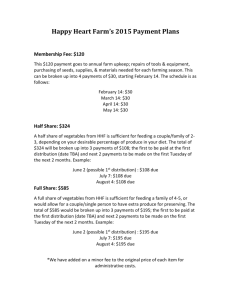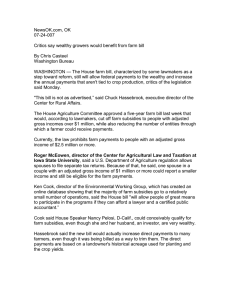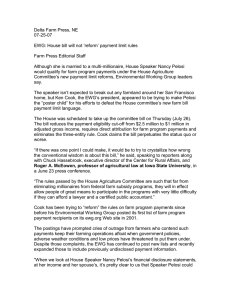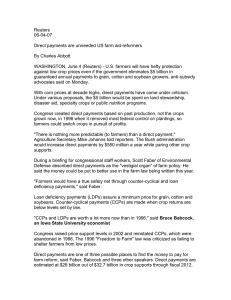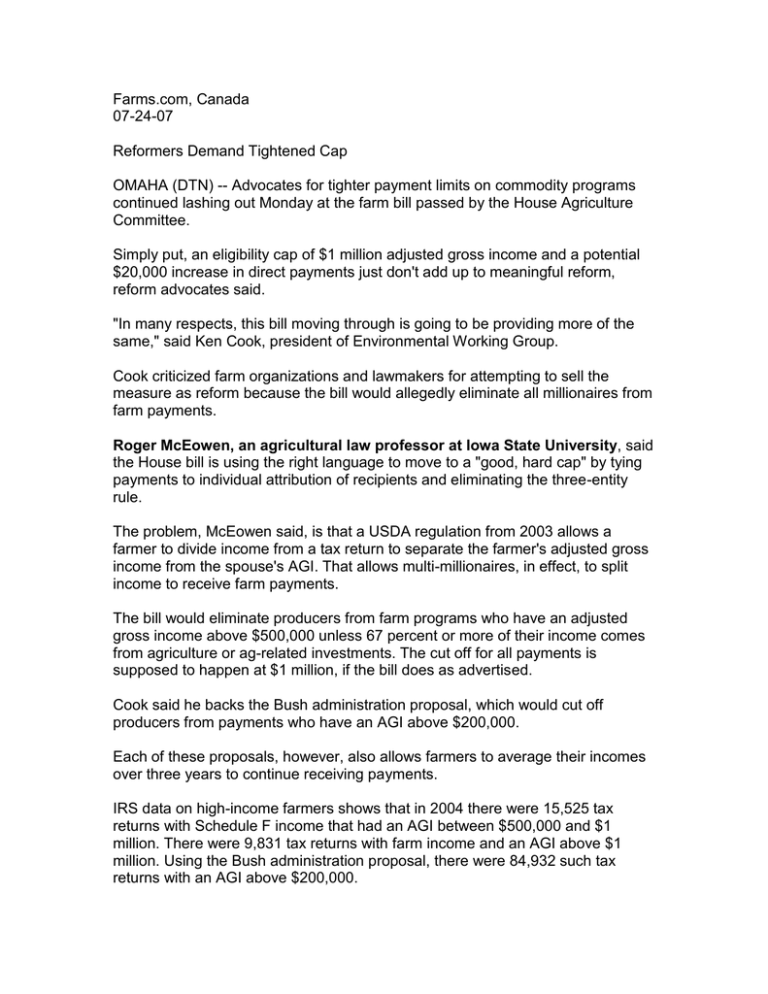
Farms.com, Canada
07-24-07
Reformers Demand Tightened Cap
OMAHA (DTN) -- Advocates for tighter payment limits on commodity programs
continued lashing out Monday at the farm bill passed by the House Agriculture
Committee.
Simply put, an eligibility cap of $1 million adjusted gross income and a potential
$20,000 increase in direct payments just don't add up to meaningful reform,
reform advocates said.
"In many respects, this bill moving through is going to be providing more of the
same," said Ken Cook, president of Environmental Working Group.
Cook criticized farm organizations and lawmakers for attempting to sell the
measure as reform because the bill would allegedly eliminate all millionaires from
farm payments.
Roger McEowen, an agricultural law professor at Iowa State University, said
the House bill is using the right language to move to a "good, hard cap" by tying
payments to individual attribution of recipients and eliminating the three-entity
rule.
The problem, McEowen said, is that a USDA regulation from 2003 allows a
farmer to divide income from a tax return to separate the farmer's adjusted gross
income from the spouse's AGI. That allows multi-millionaires, in effect, to split
income to receive farm payments.
The bill would eliminate producers from farm programs who have an adjusted
gross income above $500,000 unless 67 percent or more of their income comes
from agriculture or ag-related investments. The cut off for all payments is
supposed to happen at $1 million, if the bill does as advertised.
Cook said he backs the Bush administration proposal, which would cut off
producers from payments who have an AGI above $200,000.
Each of these proposals, however, also allows farmers to average their incomes
over three years to continue receiving payments.
IRS data on high-income farmers shows that in 2004 there were 15,525 tax
returns with Schedule F income that had an AGI between $500,000 and $1
million. There were 9,831 tax returns with farm income and an AGI above $1
million. Using the Bush administration proposal, there were 84,932 such tax
returns with an AGI above $200,000.
Chuck Hassebrook, executive director of the Center for Rural Affairs, said he
wants House Speaker Nancy Pelosi, D-Calif., to slow down and analyze the
Agriculture Committee's work instead of allowing the bill to get a floor debate
later this week.
The change in direct payments, Hassebrook said, allows a large farmer to
increase the cap in direct payments from $40,000 to $60,000, or potentially as
high as $120,000 with a husband and wife both involved in farming. That just
gives more money to larger producers to outbid smaller farmers for rental land,
he said.
"Rural people want farm programs that support family farming," Hassebrook said.
Hassebrook said he backs a farm-payment proposal currently in the U.S. Senate
that would establish a hard cap of $275,000 per year in payments.
John Hansen, president of the Nebraska Farmers Union, said he disagrees with
his friend Hassebrook in this debate. Hansen said the fact that the House
Agriculture Committee moved at all on payment limits is a positive sign, given
that the Bush administration and the Senate may push for more.
"You need to have some kind of marker in the House if you want to get anything
at all," Hansen said.
Hansen also is concerned about some reform measures that don't want to just
tighten limits on larger producers, but sweep out commodity programs for all
producers.
Cook said he backs an amendment to the House bill that will be offered by Rep.
Ron Kind, D-Wis., and others that will be unveiled Tuesday. Kind wants a tighter
clamp on payments and permanent reform of commodity programs.
"This is a very smart, reasoned amendment," Cook said.
The fight over the House bill continues Tuesday has Agriculture Committee
members, farmers, conservationists and representatives from nutrition groups
will stand together to back the bill and counter the Kind plan.
Chris Clayton can be reached at chris.clayton@dtn.com.
Copyright 2007 DTN. All rights reserved.

